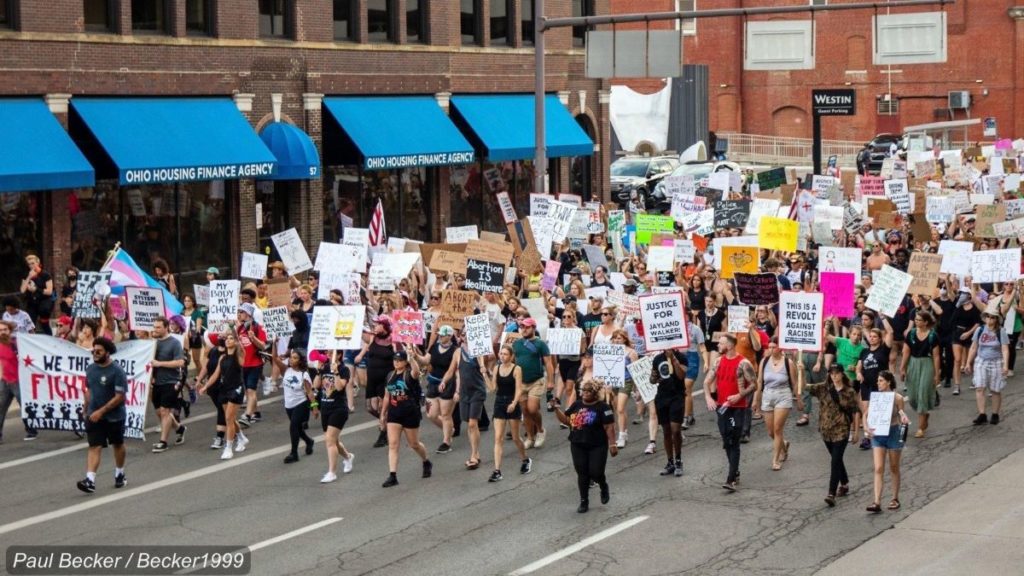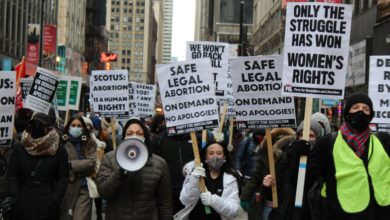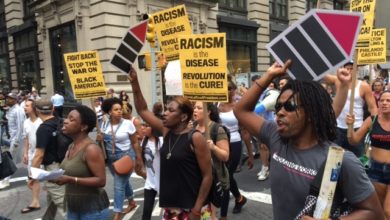On July 4, the city of Columbus, Ohio, seemed to be in two separate worlds. For some locals, the day was a celebration of the history of the United States, rejoicing with ice cream, fireworks and outdoor cookouts. However, for many it wasn’t a day to celebrate. A crowd of over 1,000 united in front of the Ohio Statehouse to say that “On this 4th, we, the people, fight back!”
Organized by the Party for Socialism and Liberation Columbus, the protest gathered supporters from across different struggles. Many came to demand justice for Jayland Walker, the 25-year-old Black man brutally killed by the police in Akron, Ohio. Many came to out to demand that abortion is a human right and for the right to bodily autonomy. Others came in solidarity with Palestine, transgender people and the houseless and to fight for working-class power.
Speakers from across these topics illustrated our common fight against our shared enemy, the capitalist- imperialist system and their oppressive police forces. Sierra Mason, an organizer for racial justice in Canton, Ohio, spoke on the need to support Walker’s family, and asked the crowd, “Could you even imagine not only losing your child, but being not being able to recognize him?” when the family had to identify his body after being shot 63 times.
Mason spoke to the reality of Black people in America, the oppression and lynching faced by the Black community, and the intersection of abortion rights and women’s rights alongside Black liberation. In a powerful act taught to her by organizers on the ground in Akron fighting for Walker, she paused and had the crowd count alongside her to 63 for every bullet fired by the police that hit Walker’s body with fists in the air. “When it comes to our human rights, [the police] are the ones that enforce the laws taking our rights away,” Mason said.
As the protest continued, speakers addressed the fight for abortion, the history and class character of the Supreme Court, worker’s power and uprisings, Black liberation and Palestinian liberation. With chants of Walker’s name, “My body, my choice,” “Long live the intifada” and “Voting blue is not enough, Democrats we call your bluff,” the crowd took to the streets. With fists raised and the call for working-class and oppressed people’s freedom, the energy was momentous.

As they marched to a stop at one intersection, the crowd held their ground and occupied the space for some 20 minutes. At the intersection, PSL Columbus organizer shenby g took the megaphone and demanded to know what freedom were “we the people” meant to celebrate. “Are we meant to celebrate the freedom to be murdered by the state? Are we meant to celebrate the freedom to starve, or die from lack of healthcare?”
The crowd condemned the white-supremacist holiday, echoing the words of Frederick Douglass. A few voices from the crowd spoke on how the 4th meant nothing while the police murder Black people and millions of women and trans people lose their access to safe and legal abortion.
The march continued, the streets swelled with rage and the masses of people demanded justice. Protestors occupied three more intersections as the night went on, including a final demonstration in front of the Columbus Police headquarters.
As news broke that the police in Akron had begun mass arrests, the Columbus crowd marched back to the statehouse so many could leave to assist in bail-fund support. A local organizer and cofounder of Black Abolitionist Collective Ohio, known as Harmony, closed out the action by explaining that the Columbus police have one of the highest rates in the United States of fatal police shootings, including fatal shootings of children — as evidenced by the killings of Tyree King, Joseph Haynes and Ma’khia Bryant. She continued that the point of the July 4 “Fight Back” action was people’s unity and the intersectionality of all the different struggles, because “it’s the people against the system. It’s the people against the state. It’s the people against oppression.”






